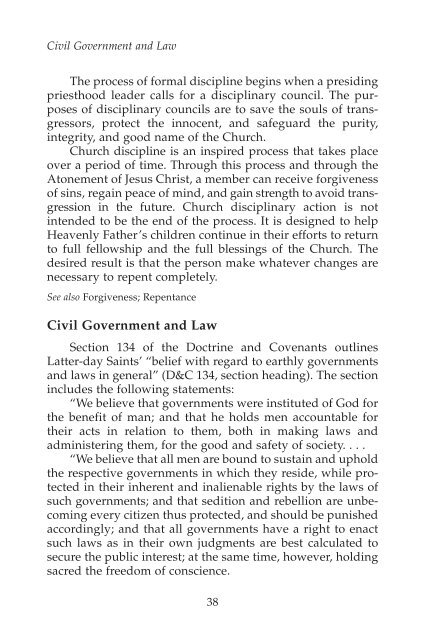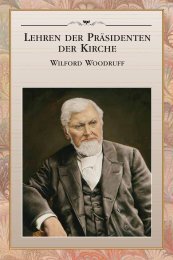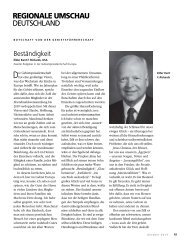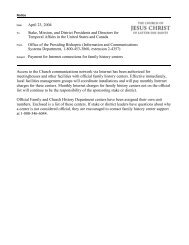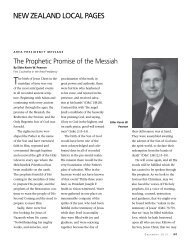True to the Faith - The Church of Jesus Christ of Latter-day Saints
True to the Faith - The Church of Jesus Christ of Latter-day Saints
True to the Faith - The Church of Jesus Christ of Latter-day Saints
You also want an ePaper? Increase the reach of your titles
YUMPU automatically turns print PDFs into web optimized ePapers that Google loves.
Civil Government and Law<br />
<strong>The</strong> process <strong>of</strong> formal discipline begins when a presiding<br />
priesthood leader calls for a disciplinary council. <strong>The</strong> purposes<br />
<strong>of</strong> disciplinary councils are <strong>to</strong> save <strong>the</strong> souls <strong>of</strong> transgressors,<br />
protect <strong>the</strong> innocent, and safeguard <strong>the</strong> purity,<br />
integrity, and good name <strong>of</strong> <strong>the</strong> <strong>Church</strong>.<br />
<strong>Church</strong> discipline is an inspired process that takes place<br />
over a period <strong>of</strong> time. Through this process and through <strong>the</strong><br />
A<strong>to</strong>nement <strong>of</strong> <strong>Jesus</strong> <strong>Christ</strong>, a member can receive forgiveness<br />
<strong>of</strong> sins, regain peace <strong>of</strong> mind, and gain strength <strong>to</strong> avoid transgression<br />
in <strong>the</strong> future. <strong>Church</strong> disciplinary action is not<br />
intended <strong>to</strong> be <strong>the</strong> end <strong>of</strong> <strong>the</strong> process. It is designed <strong>to</strong> help<br />
Heavenly Fa<strong>the</strong>r’s children continue in <strong>the</strong>ir efforts <strong>to</strong> return<br />
<strong>to</strong> full fellowship and <strong>the</strong> full blessings <strong>of</strong> <strong>the</strong> <strong>Church</strong>. <strong>The</strong><br />
desired result is that <strong>the</strong> person make whatever changes are<br />
necessary <strong>to</strong> repent completely.<br />
See also Forgiveness; Repentance<br />
Civil Government and Law<br />
Section 134 <strong>of</strong> <strong>the</strong> Doctrine and Covenants outlines<br />
<strong>Latter</strong>-<strong>day</strong> <strong>Saints</strong>’ “belief with regard <strong>to</strong> earthly governments<br />
and laws in general” (D&C 134, section heading). <strong>The</strong> section<br />
includes <strong>the</strong> following statements:<br />
“We believe that governments were instituted <strong>of</strong> God for<br />
<strong>the</strong> benefit <strong>of</strong> man; and that he holds men accountable for<br />
<strong>the</strong>ir acts in relation <strong>to</strong> <strong>the</strong>m, both in making laws and<br />
administering <strong>the</strong>m, for <strong>the</strong> good and safety <strong>of</strong> society. . . .<br />
“We believe that all men are bound <strong>to</strong> sustain and uphold<br />
<strong>the</strong> respective governments in which <strong>the</strong>y reside, while protected<br />
in <strong>the</strong>ir inherent and inalienable rights by <strong>the</strong> laws <strong>of</strong><br />
such governments; and that sedition and rebellion are unbecoming<br />
every citizen thus protected, and should be punished<br />
accordingly; and that all governments have a right <strong>to</strong> enact<br />
such laws as in <strong>the</strong>ir own judgments are best calculated <strong>to</strong><br />
secure <strong>the</strong> public interest; at <strong>the</strong> same time, however, holding<br />
sacred <strong>the</strong> freedom <strong>of</strong> conscience.<br />
38


